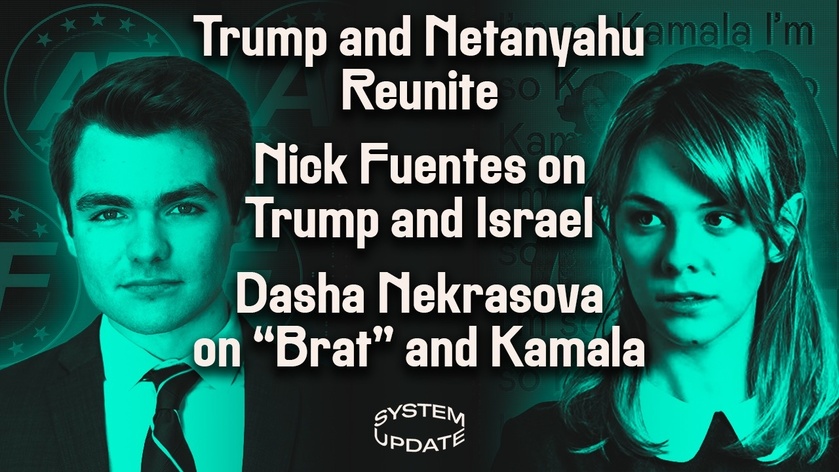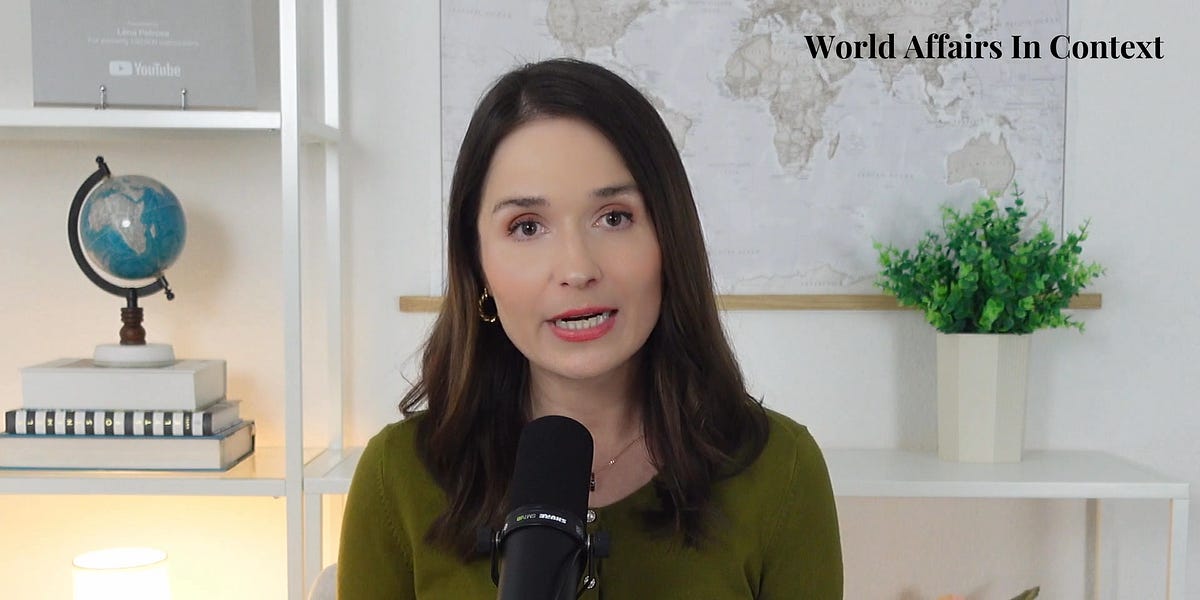Watch the full episode HERE
Interview: Nick Fuentes
So, with that, I want to get to our first guest. He is Nick Fuentes. Nick Fuentes, I'm not even sure what his title is. But I'm glad that he joined us. I know he's involved in some America First endeavor.
M. Tracey: So, Nick Fuentes, how are you, sir?
Nick Fuentes: I'm good. How are you doing, Michael?
M. Tracey: I'm okay. So, this is going to be seen as edgy and controversial that we're interviewing you here tonight. But last night, we had Cenk Uygur, and we have people across the political spectrum, and I see nothing wrong. I see it as a positive to engage with lots of people, even those who I don't agree with. Isn’t that the purpose of having shows like this?
Nick Fuentes: Absolutely.
M. Tracey: So, we're in agreement on that. Good. And I also want to say that you guys, your group had some kind of function in Detroit not too long ago and ended up getting shut down through some developments that I don't fully understand but, either way, I think that, in the United States, political groups ought to be able to hold events largely without hindrance because that's pretty foundational to the free association clause of the First Amendment. So, I'm with you on that as well.
I want to start out by establishing some common ground. But let's go to something that you said, May 31. Here is a tweet of yours that I want to ask you about.
You say you love Donald Trump but you don't trust the people he has surrounded himself with, such as Tim Scott and you referred to Lindsey Graham and Rick Grinnell in some unflattering terms. You also don't like Nikki Haley and the former Never-Trumper J.D. Vance in his administration? Well, J.D. Vance is now the vice presidential nominee. So, your, ominous omen came true there. But I just want to ask you, why do you love Donald Trump so much? I mean, why do you preface any criticism of Donald Trump with a proclamation that you love him? I mean, why love a politician at all? Donald Trump is a three-time presidential candidate, arguably even a five-time presidential candidate if you count his toying with running for the Republican nomination in 2012. Then, in 2000, he ran on as a Reform Party primary candidate against Pat Buchanan. So, he's now a career politician, essentially. I don't know, I'm not inclined to declare my undying love for any politician. So, I'm just curious why it is that you tend to precede any critique you might have of Trump with this reaffirmation of your love for him.
Nick Fuentes: Well, I think you have to consider that Trump is a pretty unique figure in American politics. I actually probably tend to agree more with you lately. I know we had a pretty strong disagreement on Twitter earlier this year, but I'm certainly closer to your camp at this point. But I would say that I always preface any criticism of Trump, I mean, first of all, it's a political reality that he is the most popular Republican in the United States, so, I think just from a purely tactical point of view, for somebody like myself, I don't necessarily want to alienate myself as a right-wing commentator from most of the Trump supporters. That is a big part of it, let's just be honest. But more than that, Donald Trump is who initially inspired me to actually become an America First nationalist or America First patriot. My show – you said that you don't know what my title is – I host a show on Rumble called America First, and I got the name from when he used that expression in his campaign and his inaugural address. He said “A new vision will govern our land. It will be only America first.” This is where I think there's a little bit more complexity, maybe, than some people are willing to admit, where before Donald Trump came into the party, conservatives said that America First was a KKK slogan because of the historical roots, of course, of that phrase with Charles Lindbergh and Henry Ford and others, they said it's an antisemitic slogan to even say that. And I think that when you look at it over time, what Trump has done as president and what he promises to do in a future term, you're absolutely right. And I've said as much on my show. There's a major contradiction. His first term did not live up to that standard. His policies now don't live up to that standard. But if it weren't for that initial campaign, in 2016, this contradiction would not be forced. And so, now, America First has been set as the standard and that was not the case before he came into office. Before, during and now even after his presidency, you see that the Republican consensus, the status quo is Neoconservatism. And you see people like DeSantis and Haley, you can even draw a distinction between what they say versus what he says. And you're right. It's not 100% America First, I have my criticisms also, but it's not the kind of insane rhetoric from people like Haley that say when it comes to Israel, we just need to say, “What do they want?” and “When do they want it?” and no questions asked. Biden has effectively done that. Also, Trump would probably be doing that as well. But certainly, it's a different standard being applied. And so, I think there's like a dialectical argument to be made that, again, even if the practical application was not lived up to it all, it has given a lot of young people – and I think a new generation of Republicans – the kind of ideological tools or dialectical tools to say “Are we living up even to America first?” So, I think that that was a really important thing that happened regardless.
M. Tracey: Okay, so I want to go to an image. This is Sheldon and Miriam Adelson in February 2020.
There's Sheldon Adelson, the late casino magnate, and his wife, who has now inherited his fortune and his political project. This is in 2020. Okay, so in 2016, Adelson funded Trump to the tune of approximately $25 million, giving to a super PAC in the 2018 midterms. Adelson, whose singular issue is pro-Israel, okay, he cares about nothing else, at least in terms of his political giving. Even when he was divorced as a younger man, he told his associates that he wanted them to find him an Israeli woman for him to remarry. And they found him one. And he's even now buried in the Mount of Olives in East Jerusalem. So, that's Sheldon Adelson’s political project. Okay? He gave to Trump, in 2016, he gave to the Republicans, in 2018, in the midterms, one of the top funders of the entire Republican Party and of the Trump coordination with congressional Republicans. And then, in 2020, he again became one of Trump's chief funders. I raise that because after the 2020 election, you led something called the “Stop the Steal” movement. Or at least you were a galvanizer or rallier for the “Stop the Steal” movement because you were just so desperate to keep Trump in power after 2020.
There's you and Ali Akbar, also known as Ali Alexander, who were some of the main organizers of that effort. And this is after Trump took all these millions from the chief funders of the cause that you now say you object to, which is orienting U.S. foreign policy inextricably with Israel. And, Trump even says that he did this at the behest of Adelson. Trump was addressing a Republican Jewish Coalition gathering last November. You said his rhetoric is different from DeSantis and Haley's, I mean, not really, Trump said at this Republican Jewish Coalition donor gala, he pointed to Miriam Adelson and said, “Your husband was so great. We moved the embassy to Jerusalem because he really wanted it.”
So, I guess my question to you is, I understand that you have these criticisms of Trump now, but all this was evident while Trump was actually in power and yet you were putting your, I guess, reputation on the line. Via this Stop the Steal. I think it was kind of a sham. No offense. Where did all that money go that was given to Stop the Steal? I mean, Trump fundraised out the wazoo for “Stop the Steal.” Desperate Republican voters were filling his coffers with money on the idea that he could, like, switch the delegate slate in Georgia or something. And I don't know, I guess. Are you having an epiphany now that you now repudiate what you were doing in 2020 to keep Trump in power? Or do you see the contradiction that I'm trying to highlight here?























